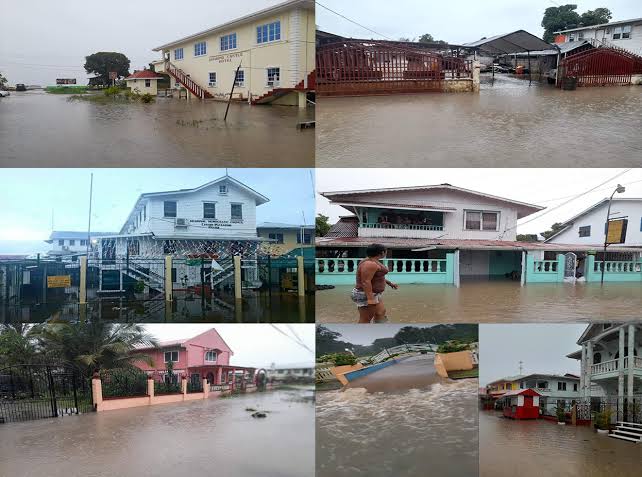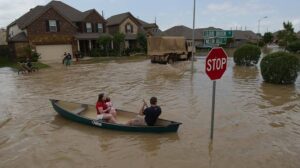
Tragic Flooding Devastates Guyana as Record Rainfall Submerges Communities, Leading to Severe Loss of Life, Destruction of Homes, and a Nationwide Humanitarian Crisis”

In a catastrophic turn of events, Guyana has been struck by unprecedented flooding, following record-breaking rainfall that has inundated large swathes of the country, causing a severe humanitarian crisis. The deluge has led to a heartbreaking loss of life, widespread destruction of homes, and an overwhelming strain on the nation’s infrastructure and emergency services.
The torrential rains, which began in early September, have resulted in the highest levels of rainfall ever recorded in Guyana’s history. The resulting floods have overwhelmed riverbanks, breached levees, and caused rivers and tributaries to overflow, submerging entire communities. The sheer volume of water has led to a dire situation where large areas are entirely under water, and countless individuals are left stranded without access to basic necessities.
Reports indicate that the floods have already claimed dozens of lives, with the number expected to rise as rescue teams continue to search through submerged areas. The devastation has not only claimed lives but has also left many people injured, displaced, and in urgent need of medical assistance. The situation is further compounded by the widespread destruction of homes, with thousands of families losing everything they own to the rising waters. In many cases, entire neighborhoods have been rendered uninhabitable, and the scale of the damage is only beginning to be understood.
The Guyanese government, in collaboration with local and international aid organizations, has been working tirelessly to provide relief and support to affected communities. Emergency shelters have been set up to accommodate displaced residents, and efforts are underway to deliver food, clean water, and medical supplies to those in need. However, the magnitude of the disaster has posed significant challenges, with logistical hurdles complicating the distribution of aid to remote and inundated areas.
The flooding has also had a profound impact on Guyana’s infrastructure. Roads, bridges, and critical utilities have been severely damaged or completely destroyed, hampering rescue and relief operations. In some regions, the damage has left communities cut off from the rest of the country, exacerbating the difficulties faced by residents and emergency responders alike. The loss of essential infrastructure is expected to have long-term effects on the country’s recovery and rebuilding efforts.
The environmental impact of the flooding is also significant. The inundation has led to the contamination of freshwater sources, posing serious health risks to the population. Agricultural lands have been submerged, threatening food security and the livelihoods of farmers who rely on their crops for income. The extensive damage to natural ecosystems, including wetlands and forests, further compounds the long-term environmental concerns.
In response to the crisis, there has been a global outpouring of support, with various countries and organizations pledging financial aid, supplies, and technical assistance to help Guyana navigate this disaster. The international community has rallied to support the country, underscoring the global solidarity in the face of such overwhelming adversity. However, the road to recovery will be long and arduous, requiring sustained efforts and resources to rebuild lives and restore normalcy.
The devastating flooding in Guyana is a sobering reminder of the vulnerability of communities to extreme weather events and the profound impact such disasters can have on individuals and nations. As the country grapples with the immediate effects of the flooding and begins to assess the full extent of the damage, the focus will inevitably shift towards recovery and rebuilding. The resilience of the Guyanese people and the support of the international community will be crucial in navigating this challenging period and ensuring a path towards recovery and renewal.
In conclusion, the unprecedented flooding in Guyana represents a grave humanitarian crisis, marked by tragic loss of life, widespread destruction, and significant challenges for recovery. The global response underscores a collective commitment to addressing the immediate needs of those affected and supporting the long-term rebuilding efforts essential for the country’s recovery.





